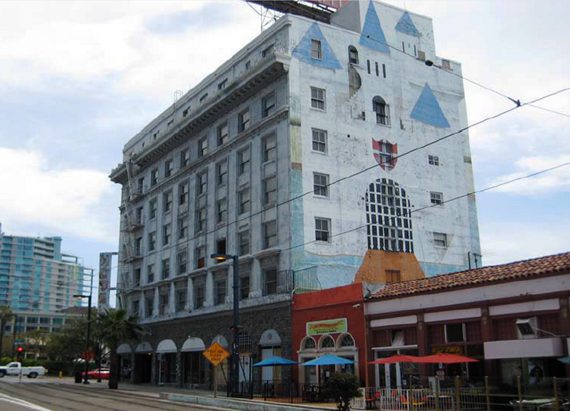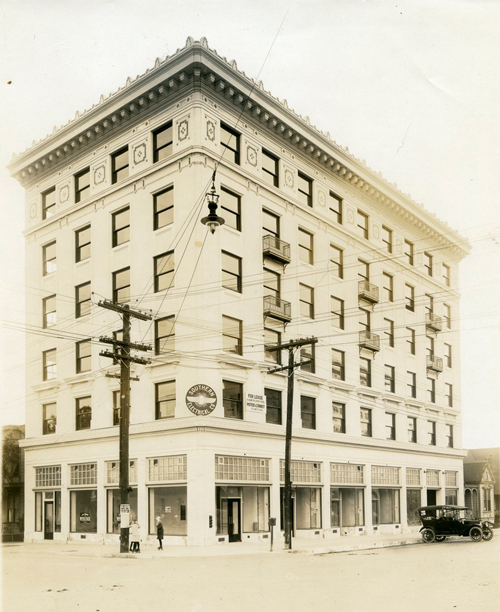|
Old hotel readying for renters
Hotel Churchill's redo at $285k per unit is high but worth it,
SOHO and veteran builder say
Written by Roger Showley
6/13/13 - San Diego Union Tribune - Original article
 Hotel Churchill, fronting on C Street between Eighth and Ninth avenues. Hotel Churchill, fronting on C Street between Eighth and Ninth avenues.
When the Hotel Churchill opened in 1915, Orrin Churchill, not Winston Churchill, the British statesman, was the builder, and it was timed to serve visitors to Balboa Park's Panama-California Exposition.
But the seven-story building at 827 C St. downtown has been out of action, like a defeated politician, for eight years, its 94 hotel-sized quarters unavailable to renters and tourists.
Now, the San Diego Housing Commission, authorized by the City Council earlier this week, aims to reboot the building into a 67-unit low-income apartment project over the next two years.
As to why this building is worth saving, Bruce Coons, executive director of the Save Our Heritage Organisation, said it would retain a sense of character in a section of the city with many new high-rises.
"I think when somebody sees this building and the way it is now and will look when it's restored, it will spur a whole lot of imagination that has been sorely lacking," he said.
The cost of $19.1 million, or $285,000 for every 350-square-foot unit, is steep - about 10 times the cost per square of new tract-built construction.
 A historic view of the Hotel Churchill in better times.
- Coons collection
|
For that figure, you could buy a bigger, single-family house in Julian, Lemon Grove or National City, according to the latest housing prices.
Veteran developer Sherm Harmer said he was not surprised by the premium paid to save this old building. Historic buildings, high-rises and affordable housing projects typically cost more than suburban houses, he said, and the requirement to pay union wages -- due to financing with federal grants -- increases the cost by 20 to 30 percent.
"I think one of the advantages of doing that building is its location," Harmer said. "(Homeless) services are concentrated downtown, unfortunately, and they're needed there, because we have an older population of people that are in distress."
Marco Vakili, executive director of the housing commission's Housing Development Partners building arm, called comparisons between downtown, high-rise rehabilitations to suburban housing unfair, given the nature of the building type.
However, he acknowledged the cost may rise 10 to 20 percent once structural engineers and project architects dig through the walls and analyze the state of the building.
Architects and engineers have been hired to investigate the building's innards with their reports expected in a few weeks. The current schedule calls for construction to start next May with completion in August 2015.
The bottom line, he said, is that more affordable housing is needed downtown, where the chronic homeless population is concentrated -- even if more units could be built for the same price in other neighborhoods.
"The big key is we're trying to keep affordable housing where it was, rather than, in a cavalier approach, move it to some neighborhood where it's less expensive," Vakili said.
The housing commission acquired the building in 2011 as a result of a dispute with the previous owner over retaining or replacing the low-income rental units in any remodeling. It had been a low-cost residential hotel that closed in 2005 and fell into disrepair. Previous owners sketched out ambitious plans in the 1990s to restore and upgrade it, but nothing came of their efforts.
The commission advertised for developers to perform the rehabilitation, but all three bids were rejected last year for various reasons. The board turned to Vakili's group, spokeswoman Maria Velasquez said, because it was experienced in such projects and additional time wouldn't be wasted if outside developers had to seek scarce federal tax credit dollars.
Also of concern were federal budget cutbacks that might have endangered the commission's use of $11.1 million in grants if the project did not go forward quickly.
Besides the federal grants, funding is coming from the city's inclusionary housing fees paid by commercial developers, Civic San Diego loans for affordable housing, a state mental health loan and private lenders.
Housing Commission report on Hotel Churchill (Download 47-page pdf)
|
ABOUT SOHO
IN THE NEWS - PREVIOUS YEARS
2024 | 2023 | 2022 | 2021 | 2020 | 2019
2018 | 2017 | 2016 | 2015 | 2014 | 2013
2012 | 2011 | 2010 | 2009 | 2008 | 2007
2006 | 2005 | 2000-2004 | 1973-1997
|

 Hotel Churchill, fronting on C Street between Eighth and Ninth avenues.
Hotel Churchill, fronting on C Street between Eighth and Ninth avenues.


